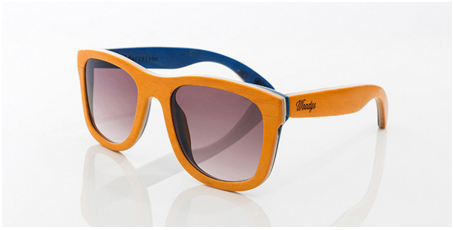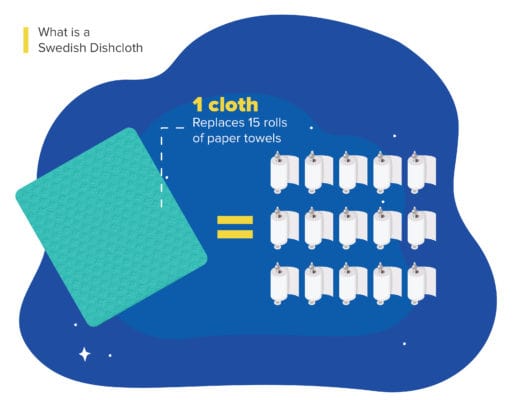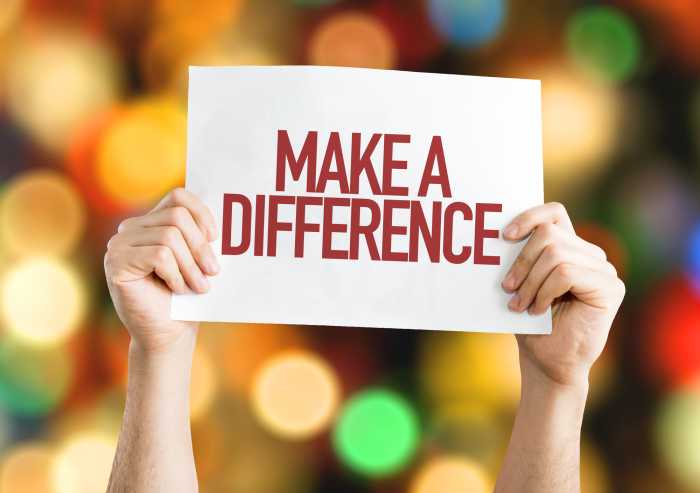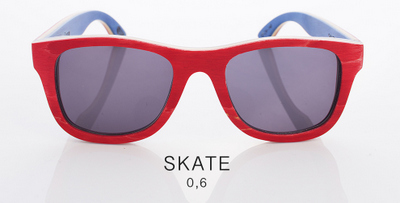
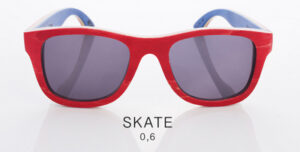
Wooden sunglasses have entered the fashion world, and perhaps at just the right time.
Plastic has become such a big problem for the oceans and wildlife, and causes so many public health problems, that while we can choose non-plastic options whenever we shop, we should! This includes sunglasses for glasses as well as regular glasses.
For Earth Day, we have worked together Smartbay Wooden Collection Just to let you know that wooden sunglasses are available. Specifically, in this post, I:
• Highlight the benefits of choosing non-plastic frames for sunglasses as well as regular eye glasses.
• Suggest ways to extend the life of your glasses so you don’t have to buy new ones again and again
• Tell you where you can donate your glasses instead of throwing them away when you need a new prescription
Why are wooden sunglasses better than plastic?
There is already too much plastic in the world! According to some estimates, there is more plastic in the oceans than fish!! Actually, fishes are eating microplastics, which means that we humans can also eat plastic ourselves. Microplastics are also getting into other foods like sea salt.
Also, manufacturing of plastic creates many pollution and health problems.
With so many better options available, there’s no need to choose plastic!
For example, Woodies Barcelona offers a wide range of wooden sunglasses that come in a variety of individually carved wood materials, including bamboo. recycled skateboard, and sustainably managed forests. Despite the frames being made of wood, the eyewear is available in a number of fun colors and trendy shapes, such as square, semi-rimless, cat-eye, and circle styles.
You can also find eyeglass frames made from recycled newspapers and recycled metal.
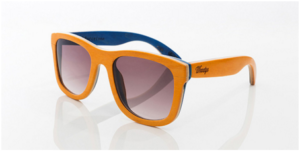
How to extend the life of your glasses
• Remove scratches
• repair arms
• Protect glasses from breakage and scratches
Like anything you buy, it’s wise to use it as long as you can. If you take proper care of your glasses they will last for years (or until you need a new prescription).
One reason you may be tempted to throw away your glasses is because the lenses are scratched. There’s no doubt about it, scratched lenses can be really annoying!
No matter how small the scratch is, it can interfere with your line of vision. This can also make them look cheap and used.
Here’s how I extend the life of my glasses and sunglasses.
Create an all-natural scratch remover solution
It is very easy to apply and once applied your lenses will look brand new. Simply follow the steps below to clean your scratched glasses.
1. Clean your glasses
First, clean the surface of your lenses to see exactly where the scratches are. Be sure to use a cleaner (especially for glasses) and a clean micro-fiber cloth.
2. Apply scratch remover
Next, apply a little toothpaste to the scratched lens and rub gently with a cotton bud or ball. Rinse the lenses with cold water to remove toothpaste. If the scratch is deep, you may need to repeat this process a few times. You can also make a paste of baking soda and water. Mix soda and water until you get a toothpaste-like consistency and apply it to the lenses in the same manner.
3. Apply scratch filling
If deep scratches remain, apply a scratch filling product. Simply rub the wax onto the lens with a clean micro-fiber cloth, and then wipe it off with a clean area of the cloth. For best results you will need to reapply the wax once a week.
Repair your glasses
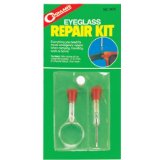 It is common for the small screws that hold the lens to the frame arm to fall out. For just a few dollars, you can get an eyeglass repair kit that includes small replacement screws, as well as the small screwdriver needed to repair glasses. Keep the kit handy so you can replace the screws, or tighten them to keep them from falling out in the first place
It is common for the small screws that hold the lens to the frame arm to fall out. For just a few dollars, you can get an eyeglass repair kit that includes small replacement screws, as well as the small screwdriver needed to repair glasses. Keep the kit handy so you can replace the screws, or tighten them to keep them from falling out in the first place
Keep your glasses safe – keep them in their case
I’m as guilty as the next person of being careless with my glasses and sunglasses. One way to make them last longer is to put them in a protective case before throwing them in your purse, briefcase or backpack. Most glasses come with some type of cloth or hard-cover case. Can also use this.
Donate
The Lions Club collects used eyeglasses and then recycles them. The nonprofit organization collects them, then delivers them to regional recycling centers. The glasses are cleaned, sorted according to prescription strength, then distributed to those in need, primarily in developing countries. In my community, the Lions have a collection bin at our local library. Many Walmart stores with vision centers also collect eyeglasses for the Lions effort. go here Contact your local Lions Club, or find the nearest Lions Eyeglass Recycling Center.

buy one, give one campaign
In collaboration with global non-profit Unite for Sight, smartbyglass Supports their Buy One, Give One campaign. For every pair of prescription lenses purchased from SmartBuyGlasses, one pair will be donated to a community in need. They strongly believe that everyone has the right to the perfect vision regardless of their socio-economic status and if you agree, you can feel happy that your purchase is going towards a great cause. You can read more about the Buy One, Give One cause Here,
Sponsor Note: Our sponsors allow us to bring you expert content at no cost to you. Our editorial opinions remain our own. Thank you.
Eco-Friendly Eyewear Questions:
- How to Find the Perfect Pair of Wooden Sunglasses for Your Face Shape
– Offer a guide on identifying your face shape (oval, round, square, etc.) and choosing complementary wooden sunglasses styles.
– Include visuals showcasing different frame shapes and their suitability for various face shapes.
– Briefly mention resources for online virtual try-on tools to help visualize frames on your face before purchase. - How to Care for Your Wooden Sunglasses for Long-Lasting Beauty
– Provide a step-by-step guide on cleaning, polishing, and applying protective oil treatments to wooden sunglasses.
– Include tips on storing your sunglasses safely to prevent scratches and warping.
– Briefly mention resources and videos demonstrating proper cleaning and care techniques for wooden eyewear. - How to DIY a Natural Eyeglass Lens Cleaner
– Offer a recipe for creating an effective cleaning solution using readily available ingredients like distilled water and white vinegar.
– Explain the importance of using a microfiber cloth for cleaning lenses to avoid scratches.
– Briefly mention commercially available lens cleaning sprays specifically formulated for eyeglasses. - How to Repair Minor Scratches on Your Eyeglass Lenses
– Explain techniques for removing minor scratches using household items like baking soda paste or toothpaste (non-gel).
– Emphasize the importance of gentle application and avoiding abrasive materials that can worsen scratches.
– Briefly mention professional lens replacement services for deeper scratches that cannot be buffed out. - How to Repurpose Old Eyeglass Cases into Sustainable Storage Solutions
– Offer creative ideas for transforming old eyeglass cases into storage containers for jewelry, tech accessories, or small craft supplies.
– Include instructions on decorating and personalizing old cases to give them a new lease on life.
– Briefly mention online communities and tutorials dedicated to upcycling and repurposing everyday items. - How to Host a Community Eyeglass Donation Drive
– Provide a guide on organizing a local drive to collect used eyeglasses for donation to those in need.
– Offer tips on partnering with optometrists, community centers, or charities to support the initiative.
– Briefly mention resources and online tools for finding eyeglass donation drop-off locations near you. - How to Choose Eco-Friendly Packaging When Buying Eyewear Online
– Explain the importance of sustainable packaging when shopping for sunglasses and eyeglasses online.
– Discuss options like recycled cardboard boxes, biodegradable packing peanuts, and minimal plastic use.
– Briefly mention online retailers known for their commitment to sustainable packaging practices. - How to Build a DIY Bamboo Sunglasses Case
– Offer a step-by-step tutorial with pictures on constructing a simple and stylish case from bamboo fabric or scraps.
– Include instructions on customizing the case size and adding decorative elements.
– Briefly mention online stores selling pre-made bamboo or other eco-friendly eyeglass cases as an alternative. - How to Advocate for Sustainable Practices in the Eyewear Industry
– Explain the environmental impact of traditional eyewear production and the benefits of sustainable alternatives.
– Offer tips on contacting eyewear brands and retailers to encourage them to adopt eco-friendly practices.
– Briefly mention organizations promoting sustainable manufacturing and ethical sourcing in the fashion industry. - How to Identify Reputable Brands Committed to Eco-Friendly Eyewear
– Explain key factors to consider when choosing sustainable eyewear brands, such as material sourcing, manufacturing practices, and transparency.
– Offer resources and online tools to help identify brands certified or recognized for their environmental commitment.
– Briefly mention the importance of supporting ethical and sustainable businesses within the eyewear industry.
FAQs:
Plastic Pollution: Plastic production and disposal contribute significantly to plastic pollution in our oceans and landfills, harming wildlife and ecosystems.
Microplastics: Plastic breakdown creates microplastics, tiny fragments that enter the food chain, potentially impacting human health.expand_more
Health Concerns: Certain chemicals used in plastic manufacturing might pose health risks depending on the type of plastic used.
Sustainability: Wood is a renewable resource if harvested responsibly from sustainably managed forests.expand_more
Durability: Wooden frames can be surprisingly strong and long-lasting with proper care.expand_more
Unique Style: Wood offers natural variations in grain and color, creating unique and stylish frames.expand_more
Lightweight Comfort: Many wooden sunglasses are lightweight and comfortable to wear for extended periods.
Wooden sunglasses offer significant environmental benefits compared to plastic. Unlike plastic, which is derived from petroleum and contributes to pollution throughout its lifecycle, wooden sunglasses utilize renewable resources. By opting for wood, consumers reduce reliance on fossil fuels and help mitigate the environmental impact of plastic production and disposal, including marine pollution.
Wooden sunglasses play a crucial role in reducing plastic pollution by offering a sustainable alternative to traditional plastic frames. By decreasing the demand for plastic eyewear, consumers help alleviate the burden on landfills and oceans, where plastic waste poses a severe threat to marine life. Choosing wooden sunglasses promotes responsible consumption and encourages eco-friendly practices.
Wooden sunglasses are crafted from a variety of sustainably sourced materials, including bamboo, reclaimed skateboard wood, and wood from responsibly managed forests. These materials are chosen for their durability, unique aesthetics, and environmental compatibility. Each pair of wooden sunglasses embodies the natural beauty of wood while minimizing the ecological footprint of eyewear production.
Yes, wooden sunglasses offer a wide range of styles, shapes, and colors, ensuring that consumers have diverse and fashionable eyewear options. From classic designs to modern trends, wooden sunglasses cater to various preferences while promoting sustainability. Additionally, the natural textures and grain patterns of wood add a distinctive touch to each pair, making them both stylish and environmentally conscious.
To maximize the lifespan of wooden sunglasses, proper care and maintenance are essential. This includes regularly cleaning the lenses with a microfiber cloth and storing the sunglasses in a protective case when not in use to prevent scratches and damage. Additionally, avoiding exposure to extreme temperatures and moisture can help preserve the integrity of the wood and prolong the longevity of the eyewear.
Removing scratches from wooden sunglasses requires gentle yet effective techniques. You can use natural scratch remover solutions like toothpaste or a paste of baking soda and water to buff out minor scratches on the lenses. For deeper scratches, consider using specialized scratch-filling products designed for wooden surfaces to restore the appearance of your sunglasses.
If the screws on your wooden sunglasses become loose or fall out, you can utilize an eyeglass repair kit to address the issue. These kits typically include replacement screws and a screwdriver for easy repairs. By tightening loose screws or replacing missing ones, you can maintain the structural integrity of your wooden sunglasses and ensure a comfortable fit.
Protecting your wooden sunglasses from damage involves proactive measures such as storing them in a protective case when not in use and avoiding exposure to harsh environmental conditions. Additionally, regularly inspecting the frames and lenses for signs of wear and tear allows you to address any issues promptly and prevent further damage.
Yes, several eco-friendly alternatives to plastic frames exist, including eyewear made from recycled materials such as newspapers or metal. These alternatives offer similar style choices while reducing environmental impact and promoting sustainability. By exploring diverse options, consumers can find eyewear that aligns with their values and preferences.
Yes, donating old glasses is a sustainable and compassionate choice. Many organizations accept donated glasses and distribute them to individuals in need, both domestically and internationally. Additionally, some organizations recycle old glasses to support charitable causes or provide vision care services to underserved communities. By donating your old glasses, you can make a positive impact and extend the life cycle of eyewear while helping others in need.

